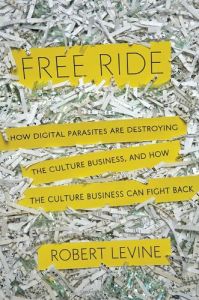Melden Sie sich bei getAbstract an, um die Zusammenfassung zu erhalten.

Melden Sie sich bei getAbstract an, um die Zusammenfassung zu erhalten.
Robert Levine
Free Ride
How Digital Parasites are Destroying the Culture Business, and How the Culture Business Can Fight Back
Doubleday, 2011
Was ist drin?
How did you help destroy culture today?
Recommendation
Journalist Robert Levine knowledgeably argues that ideology, inaction, misunderstanding and self-interest have created a dangerous situation in which technology is destroying culture. Fortunately, the culture industry can survive if it takes action. In this factually grounded report, Levine passionately urges the culture community – from big publishers to guitar players – to act in its own best interests and to protect its products. getAbstract recommends his treatise to those involved in culture, futurists and anyone interested in a healthy economy where creativity pays.
Summary
About the Author
Robert Levine, a former executive editor of Billboard, is a features editor at Wired. He has written numerous articles for The New York Times, Fortune, Vanity Fair and Rolling Stone.










Comment on this summary